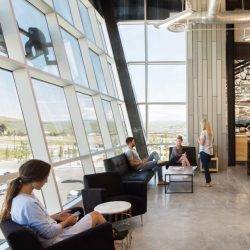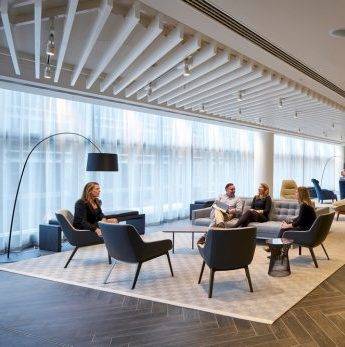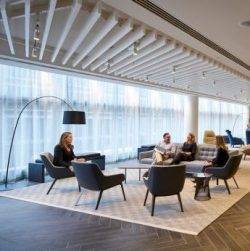June 21, 2018
The future of the workplace emerges from the mists at Neocon
 Chicago is one of the world’s great cities. Its dramatic lake and river setting, its magnificent architecture and its raw energy inspire the locals and businesses to achieve great things. People work and play very hard. Competition is fierce both in business as in the way the people relate to each other, and befits a city heavily influenced by waves of immigration down the ages. Apart from somewhat overly aggressive and noisy driving, if there is friction, you don’t sense it and it isn’t obvious. Most locals seem genuinely open and friendly, including to strangers, and happy to get on with their lives without troubling others. Perhaps they’re all being buoyed up by the great street music which is everywhere.
Chicago is one of the world’s great cities. Its dramatic lake and river setting, its magnificent architecture and its raw energy inspire the locals and businesses to achieve great things. People work and play very hard. Competition is fierce both in business as in the way the people relate to each other, and befits a city heavily influenced by waves of immigration down the ages. Apart from somewhat overly aggressive and noisy driving, if there is friction, you don’t sense it and it isn’t obvious. Most locals seem genuinely open and friendly, including to strangers, and happy to get on with their lives without troubling others. Perhaps they’re all being buoyed up by the great street music which is everywhere.










 There is a critical need for to simplify the regulatory framework designed to improve energy efficiency in commercial buildings finds a recent report from the Environmental Industries Commission (EIC) Carbon Management & Sustainable Buildings Working Group. It also suggests that Brexit could act as a spur to rethink the right combination of policies to reform enforcement systems. The report, Improving non-domestic energy efficiency after Brexit, one of a series EIC is publishing setting out its members’ views on the impact of Brexit on environmental policy and how policy should evolve after the UK leaves the EU, covers the breadth of energy efficiency policy for non-domestic buildings. As part of its research, EIC surveyed England’s local authorities, who have responsibility for trading standards, finding that out of those that responded (122 out of 149), no local authorities have been issuing fines for failing to display Energy Performance Certificates or Display Energy Certificates.
There is a critical need for to simplify the regulatory framework designed to improve energy efficiency in commercial buildings finds a recent report from the Environmental Industries Commission (EIC) Carbon Management & Sustainable Buildings Working Group. It also suggests that Brexit could act as a spur to rethink the right combination of policies to reform enforcement systems. The report, Improving non-domestic energy efficiency after Brexit, one of a series EIC is publishing setting out its members’ views on the impact of Brexit on environmental policy and how policy should evolve after the UK leaves the EU, covers the breadth of energy efficiency policy for non-domestic buildings. As part of its research, EIC surveyed England’s local authorities, who have responsibility for trading standards, finding that out of those that responded (122 out of 149), no local authorities have been issuing fines for failing to display Energy Performance Certificates or Display Energy Certificates.










 A major research study “
A major research study “
 Business Secretary Greg Clark proposed new laws in Parliament yesterday (June 11th) that new large firms will have to justify their chief executives’ salaries and reveal the gap to their average UK worker. It means that for the first time, UK listed companies with more than 250 UK employees will have to disclose and explain this difference – known as ‘pay ratios’ – every year. However, according to data published today by the Chartered Management Institute (CMI) and
Business Secretary Greg Clark proposed new laws in Parliament yesterday (June 11th) that new large firms will have to justify their chief executives’ salaries and reveal the gap to their average UK worker. It means that for the first time, UK listed companies with more than 250 UK employees will have to disclose and explain this difference – known as ‘pay ratios’ – every year. However, according to data published today by the Chartered Management Institute (CMI) and 









June 21, 2018
The hype surrounding wellbeing concepts can blind us to their true value
by Georgia Elliott-Smith • Comment, Wellbeing
More →